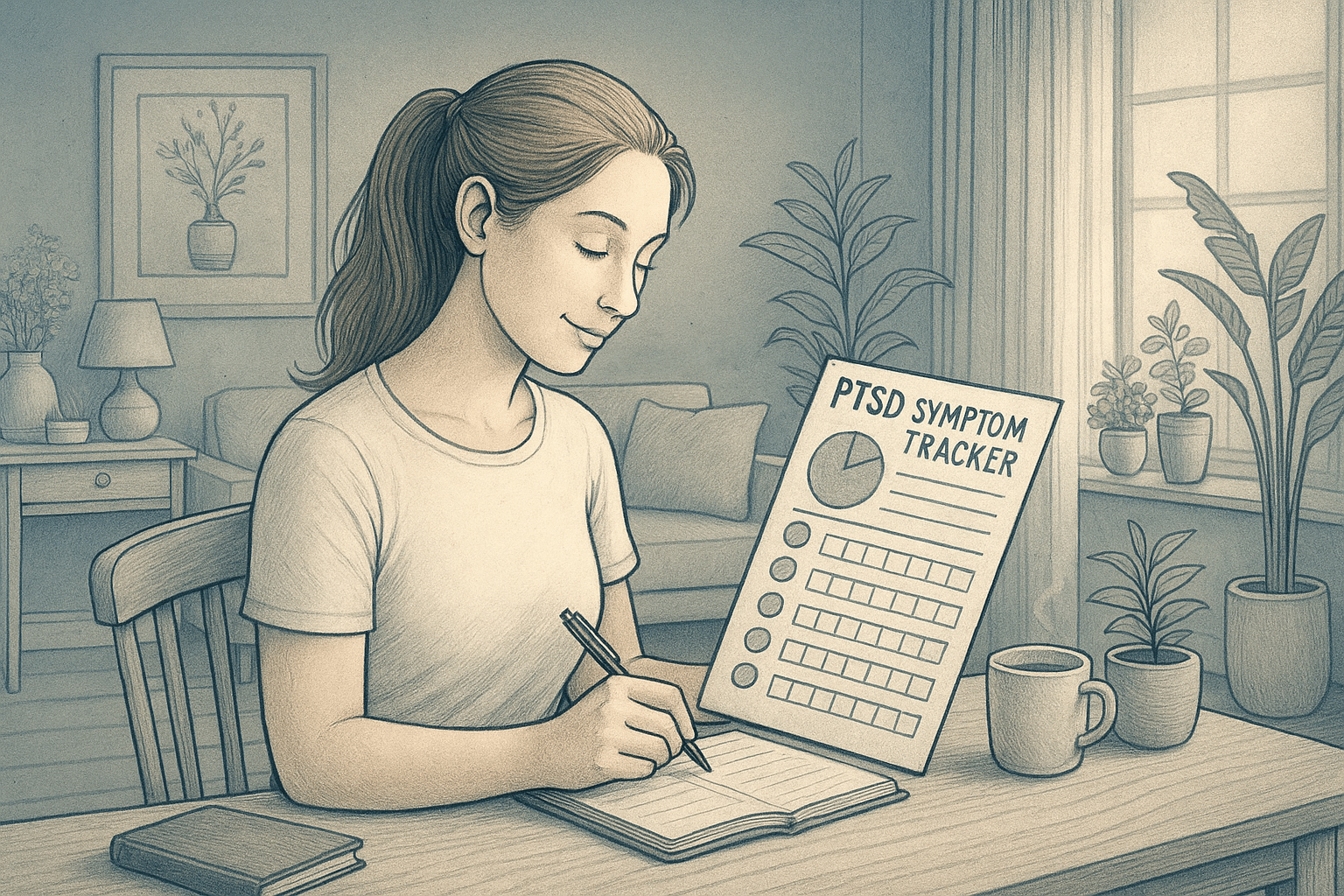
Key Takeaways
- A PTSD symptom tracker helps you monitor symptoms and identify patterns over time providing valuable insights that allows you to take control of your healing journey.
- Consistent tracking creates a detailed record of your symptoms over time, making it easier to recognize improvements and challenges in your recovery process.
- ICD-11 and DSM-5 standards provide a reliable framework for symptom tracking.
- When shared with healthcare providers, your symptom tracking data can lead to more personalized and effective treatment plans customized to your specific needs.
- Mission Connection offers comprehensive trauma treatment that can be enhanced by bringing your symptom tracker insights to our specialists, helping us develop targeted therapeutic approaches.
What is a PTSD Symptom Tracker?
A PTSD symptom tracker is a tool designed to help individuals monitor and document their symptoms over time. It’s like keeping a diary, but specifically for your mental health. By recording your symptoms regularly, you can start to see patterns and gain insights into what might be triggering them.
Purpose of PTSD Symptom Tracker
The main purpose of a PTSD symptom tracker is to provide a structured way to log symptoms. This can include everything from nightmares and flashbacks to feelings of anxiety or avoidance. The goal is to create a detailed record that can help you understand your experiences better.
Difference Between Diagnosis and Tracking
Note that a symptom tracker is not a diagnostic tool. While it can provide valuable insights, it doesn’t replace a professional diagnosis. Instead, it complements the diagnostic process by offering a clearer picture of your symptoms, which can be invaluable during consultations with healthcare providers.
Relevance of ICD-11 and DSM-5 Standards
PTSD symptom trackers are often based on the diagnostic criteria from the World Health Organization’s ICD-11 and the American Psychiatric Association’s DSM-5. These standards ensure that the symptoms you’re tracking align with recognized mental health frameworks, making your records more reliable and relevant in clinical settings.
Mission Connection offers flexible outpatient care for adults needing more than weekly therapy. Our in-person and telehealth programs include individual, group, and experiential therapy, along with psychiatric care and medication management.
We treat anxiety, depression, trauma, and bipolar disorder using evidence-based approaches like CBT, DBT, mindfulness, and trauma-focused therapies. Designed to fit into daily life, our services provide consistent support without requiring residential care.
Why Track PTSD Symptoms?
Understanding Symptom Patterns
By tracking your symptoms over time, you can start to notice patterns. For instance, you might find that certain events or times of the year exacerbate your symptoms. Recognizing these patterns can be the first step in managing them more effectively.
Identifying Triggers for PTSD
A PTSD symptom tracker can help you identify triggers. Knowing what sets off your symptoms can empower you to avoid these triggers or prepare coping strategies in advance. It’s like having a map to manage the complexities of PTSD.
Supporting Healthcare Provider Discussions
When you have a detailed log of your symptoms, you can have more informed discussions with your healthcare provider. This can lead to better treatment plans customized to your specific needs. Your tracker acts as a bridge between your experiences and the professional help you receive.
How to Use a PTSD Symptom Tracker
Getting Started with a Tracker
Starting with a symptom tracker is simple. You can choose a digital app or a physical journal, depending on your preference. The goal is to commit to using it regularly, so pick a format that fits your lifestyle.
Setting Personalized Parameters

To set personalized parameters, consider what aspects of your PTSD impact you the most. Here’s how you can do this:
- Identify Key Symptoms: List the symptoms you experience most frequently.
- Include Emotional States: Track feelings like anxiety, fear, or sadness.
- Note Triggers: Record potential triggers such as specific events or environments.
- Time and Duration: Include when symptoms occur and how long they last.
Daily Symptom Logging Techniques
Logging your symptoms daily helps to capture an accurate picture of your mental health. But how do you ensure consistency without feeling overwhelmed? Start by setting a specific time each day to update your tracker. This could be in the morning when you reflect on the previous day or in the evening when the day’s experiences are fresh in your mind.
Be honest and detailed in your entries. This tracker is for you, so don’t shy away from noting down even the smallest of details. Over time, these daily logs will accumulate into a valuable resource that reveals trends and patterns in your symptoms.
Benefits of Consistent Tracking
Clarity and Insight Into Progress
Consistent tracking provides clarity about how your symptoms change over time. You might notice that certain interventions or therapies are having a positive impact, or perhaps identify areas where additional support is needed. This clarity can be incredibly eye opening, giving you a sense of control over your mental health journey.
Also, seeing your progress documented can boost your confidence. It’s a tangible reminder that you are actively working towards understanding and managing your PTSD, one day at a time.
Facilitating Better Treatment Outcomes

Your detailed logs provide your mental healthcare provider with invaluable information that can guide treatment adjustments. Whether it’s tweaking medication or exploring new therapy options, your tracker ensures that decisions are based on comprehensive, real-world data.
Empowerment in Self-Understanding
Tracking your symptoms is more than data collection; it’s self-discovery. As you review your entries, you’ll gain a deeper understanding of how PTSD affects your life. This self-awareness is a crucial step towards healing, as it allows you to identify what works for you and what doesn’t.
Tips for Effective Symptom Tracking
Regularly Reviewing Logged Data
Don’t just record your symptoms and forget about them. Regularly review your logged data to identify patterns and trends. This review process can be enlightening and reveal insights that may have gone unnoticed in the day-to-day bustle.

Reflect on your entries and consider discussing any significant findings with your healthcare provider. This proactive approach will keep you engaged with your mental health journey and open up opportunities for targeted interventions.
Customizing the Tracker to Suit Your Needs
Customizing your PTSD symptom tracker makes it an effective tool for you. Start by identifying the specific symptoms and situations that affect you most. This could be anything from recurring nightmares to heightened anxiety in crowded spaces.
Tailoring the tracker to your unique experiences ensures it remains relevant and useful in your journey towards better mental health.
Sharing Data with Healthcare Providers
When you bring your detailed logs to appointments, you offer your doctor or therapist a clearer picture of your experiences. This can lead to more informed decisions about your treatment plan.
Be open with your provider about what you’ve tracked. Discuss any patterns or triggers you’ve identified and ask for their input. This collaborative approach can significantly enhance the effectiveness of your treatment, ensuring it’s customized to your specific needs.
Mission Connection’s Approach to PTSD Management Through Symptom Tracking

A PTSD symptom tracker is more than just a record-keeping tool—it’s a powerful ally in your healing journey. At Mission Connection, we’ve seen firsthand how consistent symptom tracking helps our clients gain clarity about their experiences and take an active role in their recovery process.
When you bring your symptom tracker insights to our trauma specialists, you provide us with invaluable information that helps us customize your treatment plan. Our evidence-based trauma therapies work in tandem with your tracking efforts, creating a comprehensive approach to addressing your PTSD symptoms at their source.
We believe in empowering you through understanding. By combining your personal insights from symptom tracking with our professional expertise in trauma treatment, we create a partnership focused on your healing. Our team in California, Virginia, and Washington guides you through interpreting your tracking data and developing effective coping strategies for triggers you’ve identified.
Don’t manage PTSD alone. At Mission Connection, we offer a safe, supportive environment where your experiences are validated and your recovery is prioritized. Let us help you transform your symptom tracker data into actionable steps toward healing and reclaiming your life after trauma.
Call Today 866-833-1822.
Frequently Asked Questions (FAQ)
How Often Should I Log My Symptoms?
For the most accurate picture, aim to log your symptoms daily. This doesn’t have to be a lengthy process; even a few minutes each day can provide valuable insights over time. Consistency is key to identifying patterns and making informed decisions about your mental health.
Can a Symptom Tracker Replace Therapy?
No, a symptom tracker is not a replacement for professional therapy. While it offers valuable insights and aids in self-understanding, therapy provides a structured and supportive environment for healing. Use your tracker as a complementary tool to enhance your therapy sessions.
How Does a Tracker Identify Triggers?
A tracker helps identify triggers by allowing you to record the context and circumstances surrounding your symptoms. Over time, you may notice certain patterns, such as specific situations or environments that consistently precede symptom flare-ups. Recognizing these patterns can help you avoid or prepare for potential triggers.
What should I do if I notice my symptoms worsening in my tracker?
If you notice worsening symptoms in your tracker, reach out to a healthcare provider immediately. At Mission Connection, our trauma specialists can review your symptom patterns, adjust your treatment plan accordingly, and provide additional support during difficult periods. Your tracker serves as an early warning system that helps us respond quickly to changes in your condition.








